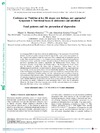Identificador persistente para citar o vincular este elemento:
https://accedacris.ulpgc.es/jspui/handle/10553/52559
| Título: | Food patterns and the prevention of depression | Autores/as: | Martínez-González, M. Sánchez-Villegas, A. |
Clasificación UNESCO: | 3206 Ciencias de la nutrición | Palabras clave: | CVD Dietary inflammatory index Inflammation PREDIMED SUN cohort |
Fecha de publicación: | 2016 | Publicación seriada: | Proceedings of the Nutrition Society | Conferencia: | Meeting of the Irish-Section of the Nutrition-Society / Conference on Nutrition at Key Life Stages - New Findings, New Approaches / Symposium 1 on Nutritional Issues in Adolescence and Adulthood | Resumen: | An emerging field of research in nutritional epidemiology is the assessment of several links between nutritional quality and mental health. Specifically, some studies have pointed out that several food patterns could be associated with a reduced risk of depression among adults. This association seems to be consistent across countries, cultures and populations according to several systematic reviews and meta-analyses of observational studies. Some previously described food patterns, specifically the Mediterranean Food Pattern, the Alternative Healthy Eating Index, the Prudent diet or the Provegetarian Food Pattern may be effective to reduce the future risk of depression. Among them, only the Mediterranean Food Pattern has been tested for primary prevention in a large randomised trial, but the inverse association found was not statistically significant. The scientific report of the 2015 Dietary Guidelines for Americans Advisory Committee concluded that current evidence is still limited. Notwithstanding, this field is promising and, according to large and well-conducted observational studies, food patterns potentially associated with reduced risk of depression are those emphasising seafood, vegetables, fruits and nuts. There is a need to assess whether differences in the intake of some micro or macronutrients between these dietary patterns can make a difference in their association with a lower risk of depression. Moreover, the shape of the dose-response curve and the potential existence of a nonlinear threshold effect have not yet been established. | URI: | https://accedacris.ulpgc.es/handle/10553/52559 | ISSN: | 0029-6651 | DOI: | 10.1017/S0029665116000045 | Fuente: | Proceedings of the Nutrition Society [ISSN 0029-6651], v. 75 (2), p. 139-146 |
| Colección: | Artículos |
Citas SCOPUSTM
77
actualizado el 08-jun-2025
Citas de WEB OF SCIENCETM
Citations
78
actualizado el 08-feb-2026
Visitas
61
actualizado el 10-ene-2026
Descargas
297
actualizado el 10-ene-2026
Google ScholarTM
Verifica
Altmetric
Comparte
Exporta metadatos
Los elementos en ULPGC accedaCRIS están protegidos por derechos de autor con todos los derechos reservados, a menos que se indique lo contrario.
